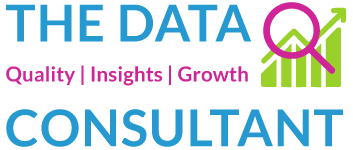Frequently Asked Questions
How can I use data to improve my business decisions?
Leveraging data for business decisions involves firstly collecting data from your sales, customer interactions, and operational processes. The next step will involve cleaning the data and making sure it is recent and relevant. You can then use simple data analysis techniques such as Pivot Charts in Microsoft Excel to visualise the data. Utilising tools like Microsoft Excel for data analysis can be a starting point, with the potential to adopt more advanced analytics software such as Tableau, Power BI or Looker as your business needs evolve.
By using data visualisation techniques to turn data into information, you can then identify trends, customer preferences, and areas for improvement or opportunity. Implementing data-driven strategies, such as targeted marketing campaigns and optimised processes, can significantly enhance decision-making, leading to increased profitability and business growth.
The key to making an impact on your business is to ensure that this information is further translated into actionable insights, so that your teams can change course or reinforce a commitment to a particular strategy.
What are the best tools for data analysis for a small to medium-sized business?
For small to medium-sized businesses, selecting user-friendly and cost-effective data analysis tools is crucial. Microsoft Excel is a fundamental tool that supports a wide range of data analysis tasks. Pivot Tables are a great way to visualise data quickly and easily. Microsoft Excel also has a range of Data Analysis functions such as WhatIf Analysis, Forecasting and Solver that business users can upskill on pretty quickly. For more advanced analysis Microsoft Excel has a Data module that will create Descriptive Statistics, Histograms, Correlations and Regressions.
What does a Data Consultant do?
A Data Consultant specialises in analysing and interpreting data to help businesses make informed decisions, improve operations, and optimise strategies. We work closely with clients to identify data-related challenges, develop data management strategies, and implement solutions that leverage data analytics for business growth.
This may include conducting data audits, designing data collection systems, selecting appropriate analytics tools, and providing insights on market trends, customer behaviour, and operational efficiency. Data Consultants play a critical role in guiding businesses through the complexities of data utilisation, ensuring that data-driven strategies align with business objectives.
What KPIs should I track for my business?
KPIs are Key Performance Indicators. This term is often used to describe all data points in an organisation. However, metrics are any data points that can be measured, whilst Key Performance Indicators (KPIs) are standalone metrics used to measure specific activities, products or initiatives. They are quantitative and can be financial or non-financial metrics.
How can I use data strategy to make a difference in my business?
Using a data strategy can positively impact your business by increasing revenue, decreasing costs and improving customer experience.
Data plays a critical role in optimising your pricing strategy to increase revenue. By analysing sales data, customer behaviour, and market trends, you can identify the price points that maximise profit without deterring customers. Implementing dynamic pricing models based on real-time data allows you to adjust prices in response to changes in demand, competition, and market conditions. Data-driven analysis also helps in identifying the best promotional strategies and discount offers that can increase sales volume while maintaining profitability. Through segmentation, you can tailor pricing strategies to different customer groups, ensuring you capture the maximum willingness to pay across your customer base.
Leveraging data to understand your customers’ buying patterns, preferences, and behaviours can reveal opportunities for cross-selling and up-selling. Cross-selling involves recommending complementary products or services to customers at the point of purchase, while up-selling encourages customers to purchase a higher-end or upgraded version of the product they’re interested in. By analysing past purchase data and customer interactions, you can identify which products or services are frequently bought together and target relevant cross-sell and up-sell offers to individual customers or segments.
Analysing customer insights data helps tailor your offerings to meet their needs, predict future trends, and personalise marketing efforts. Implementing customer relationship management (CRM) systems can facilitate this process by aggregating customer interactions and feedback, enabling targeted engagement strategies that foster loyalty and long-term relationships.
Data analytics can significantly contribute to cost reduction by identifying inefficiencies in your business operations, unnecessary expenses, and areas where resources are not being used optimally. By analysing spending patterns, operational processes, and inventory levels, you can make informed decisions to streamline operations, improve supply chain efficiency, and optimise staffing. Implementing predictive analytics can also help in forecasting demand more accurately, reducing the costs associated with overstocking or underproduction.
How do I improve the quality of the data in my business?
Starting with data quality involves establishing processes to ensure the accuracy, completeness, and reliability of your business data. Begin by conducting an audit of your current data to identify inconsistencies, duplicates, or errors. Implementing standardised data entry procedures and validation rules can significantly improve data accuracy. Regularly cleaning your data by removing outdated, incorrect, or incomplete information is also crucial.
Additionally, investing in data quality management tools can automate many of these processes, ensuring your data remains of high quality over time. High-quality data is foundational for making informed business decisions and gaining accurate insights from your analytics efforts.
It is often a good idea to develop a data governance policy for your organisation. Data governance refers to the collection of practices, processes, standards, and metrics that ensure the effective and efficient management of data assets within an organisation. It encompasses the overall management of the availability, usability, integrity, and security of the data employed in an enterprise. A comprehensive data governance program includes setting internal data standards and policies, establishing clear roles and responsibilities regarding data management, and implementing mechanisms to ensure compliance with these policies and external regulations such as GDPR.
The data protection principles of data accuracy and consistency, data minimisation, data storage and retention and data security all align with a strong Data Quality Management (DQM) policy.
